Mirameana - Mírame, Ana, Mira






More Posts from Mirameana and Others
ah yes
Josh Hutcherson as Peeta Mellark in the first Hunger Games makes me want to pinch his little cheek and ruffle his hair, in Mockingjay I would like to wrap him up in a blanket, give him little kisses on the forehead, and keep him in a safe place forever. In Catching Fire however…I’m about to make the baby rumor he started true.
once the quell starts, every kiss between katniss and peeta is so soft and natural. a light kiss before parting for the quell (cf, 75). another one as a greeting in the arena (cf, 77).
and, like almost everything katniss and peeta do in the quell arena, it is reminiscent of a married couple. two people who know each other so intimately and deeply that kisses and affection become a part of their routine.
and after the intensity of the beach scene, their relationship takes on a new softness, returning to that married-stage with a new reverence.
and so when katniss takes peeta's face in her hands and kisses him before they split up at the end of the quell, it parallels the kisses that peeta gave to her before the quell began (cf, 105). the ones that acted as a reassurance that they would see each other soon. the ones that promised reunion.
but, of course, the rebellion had other plans. and katniss and peeta never did get a reunion kiss.
and so, at the beginning of mockingjay, katniss is left sitting on her bed. rocking her body as she rolls the pearl between her lips. still waiting for her reunion kiss. weeks later. trying to sooth herself with the memory of peeta (mj, 32).
and that is what makes it even more tragic when katniss runs to kiss peeta after his arrival in district thirteen. because it seems like she will finally get the reunion that she has been waiting for. the one started with the kiss under the lightning tree that begged to be resolved (mj, 152).
but it didn't resolve. because her peeta doesn't show up. and instead of a soft kiss, she get bruises.
so, she is still left holding onto the pearl, trying to remember the boy with the bread (mj, 168). the one that she feels is so far away from her. the one still in snow's grasp.
and katniss gives up. she wants nothing to do with the stranger that bares her beloved's face.
but when it truly seems like she might lose her precious boy with the bread forever in the winding capitol tunnels, she leans down and kisses him fully (mj, 267).
and this kiss is not like everlark's soft, routine kisses. or their empassioned kisses like the beach scene.
instead, the kiss hidden deep in the capitol tunnels is one that solidifies the two lovers together. one that is begging him to stay with her. one that is pleading for him to not let snow take him away for good.
it is a kiss meant to remind peeta of who he is. and who katniss is. and who they are. a kiss that is meant to say everything that they don't have time for.
a kiss that signals an ultimate, long-awaited reunion.
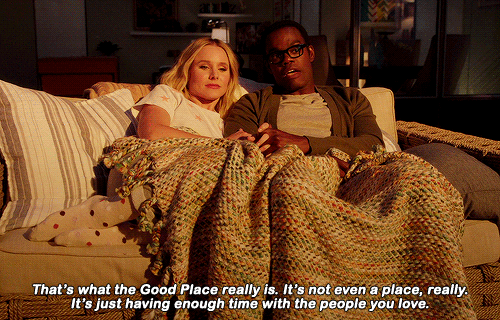
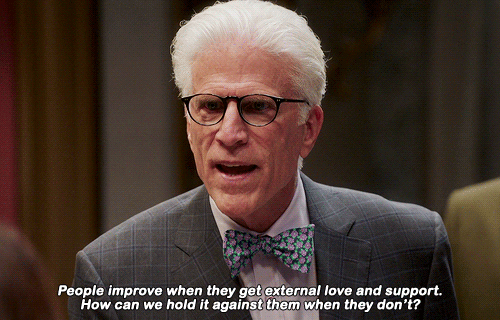
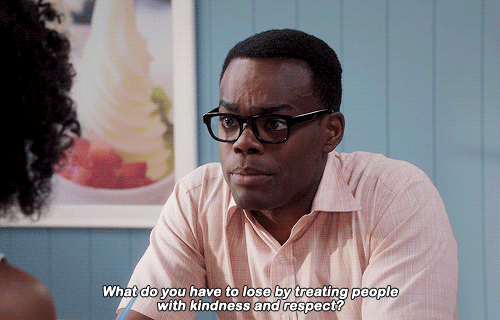
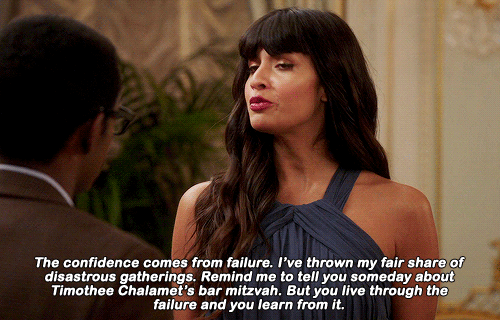

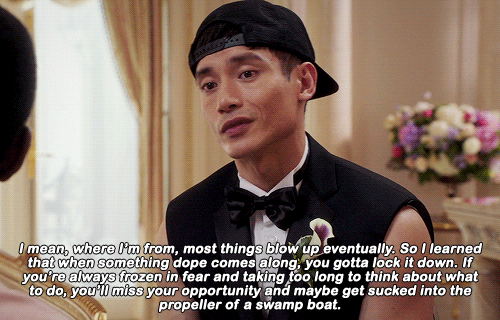
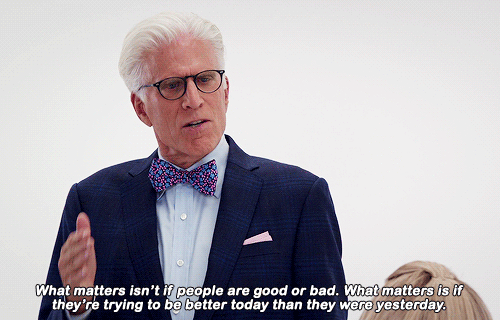
The Good Place Appreciation Week Day 6: Favorite Lesson/s
in my next life, I would like a chance to be soft - and not get belittled
or shamed
or dismissed
or laughed at for that.
i would like a chance to be bold and loud, bright and boisterous, and covered in glitter, in kisses from those I love - from head to toe - in sunlight, to get so free and unrestrained that all little parts of me would get a spotlight in this world at least twice
(one of them for this life, where I am lost and scared, and empty, always empty)
I would like to live unafraid.
- sure of my place, of my wants and dreams, of my words.
- not trying to reach out to everyone and thinking that I am healing some part of myself that wants being held and cherished, being seen, known, and remembered.
it would be such a nice life.
but in this one
i can't afford to be soft.
he is also very much alive.
can't convince me otherwise
Thinking again about how Suzanne esentially subverted the "beloved famous man that is actually a horrible person in real life" with Finnick, who is the complete opposite of that.
Finnick has this whole image costructed around him by the people that abused him for years: the Capitol's darling, their golden boy, the sex symbol of Panem, the man that has countless lovers but leaves them constantly and doesn't look back etc. And you would expect, initially, to meet a man that retains at least a part of that persona in his day to day life. But Finnick doesn't, not even one bit.
You see instead a man that is deeply in love and completely devoted to the one woman he quite literally adores, a man that protects Mags, his old mentor and his mother figure, as much as he can, a man that wouldn't leave Johanna behind, a man that gathers whatever strenght he has left to speak publicly about the abuse inflicted upon him at the government's hands; the opposite of what the Capitol's media and reputation made him out to be.
what is a love story if not falling to your knees and pressing your shaking hands to his wound, as if the desperation of your heart could stem the blood pumping out of his; and what is a love story if not holding out a sticky-sweet handful of death to the greedy cameras; and what is a love story if not your one wish being to send her home, with all the reasons why hanging golden around your neck like a willingly-worn noose; and what is a love story if not hitching yourself to the puppet strings of politicians in a last ditch attempt to save each other across the miles; and what is a love story if not the ever- unspoken mantra “take my life: take it, take it, take it” — and what is a love story if not the burned and blistered realization that offering up your life is not enough, not quite, but that offering your lover’s life back to them might just be? so you plant her primroses in the ash, and you mend his mind with the thread of new memories, and it isn’t pretty, but it is a love story — because what else could it be?
how do you think it happened?
was it the realization that hit her in the dead of night, with only his steady breath and the ghosts of a forgotten district to keep her company?
the realization that the ache in her chest when she saw him in pain was not simply a heart attack. or that the subtle pitter patters that danced around her heart only seemed to accompany him.
was it the smile that she couldn't help but bare as she whisked her feet towards the towering victor's village? where he would be awaiting her, arms offering bread. offering life.
was it the warmth that spread from her fingertips as his knuckles fit perfectly against hers. uniting them. as friends. as allies. as something so much more.
was it the soft kisses that peppered caresses that wiped away tears? tears of a tormented past. mixed with the reassurance that, after everything, at least they still had each other. and that was enough.
or did it come slowly? as she stared at the curves of his face in the dark, illuminated by candlelight. reminding her of the different colors and shapes that touched his face in their years together.
like the bruise he bore to save her. or the crinkle in between his eyebrows that deepened when he realized she was going to do anything to save him. even if that meant she didn't make it home. or the terror that flooded his features as he refused to let her go. making her live to see another day.
and maybe, in the quiet solitude of their room, the memory of his many faces sprinkled throughout their history pointed to one thing. his goodness.
the goodness that forged them together. from the bread to the primrose. the goodness that reminded her that there was a future to hope for. the goodness that reminded her that she had goodness of her own. and that she always had.
how do you think it happened? that inevitable declaration. the kind that wasn't as much of a declaration but rather a confirmation of feelings brewing under the surface. feelings that crept up on her.
ones that had been real all along.
People need to understand that Zutara isn't about Zuko being the hot and sexy dream guy that makes Katara swoon. It's about their complimentary Tired Parent™️ energy and the fact that Zuko is—at all times—slightly terrified of Katara in the most smitten way possible.
Themes of Implicit Submission in The Hunger Games (Book One)
I’ve just finished re-reading The Hunger Games (book one) and there are a few themes that I expect SOTR will develop based on Hume’s implicit submission theory. Specifically, these are the main six tactics I believe the Capitol uses to thwart another rebellion present in the first book alone:
Societal Pressure:
District 12 has a “keep your head down” culture. Any talks of rebellion are frowned upon. Any anti-government statements will cause social repercussions. It’s not just Katniss rolling her eyes at Gale in the woods, it’s how she has been groomed by the culture to keep quiet about the issues pervading life in the district:
“When I was younger, I scared my mother to death, the things I would blurt about District 12, about the people who rule our country, Panem, from the far-off city called the Capitol. Eventually, I understood this would only lead us to more trouble. So I learned to hold my tongue and to turn my features into an indifferent mask so that no one could ever read my thoughts. Do my work quietly in school. Make only polite small talk in the public market. Discuss little more than trades in the Hob.… Even at home, where I am less pleasant, I avoid discussing tricky topics. Like the reaping, or food shortages, or the Hunger Games. Prim might begin to repeat my words and then where would we be?” (p.6)
All of this proceeds the statement:
“Even here, in the middle of nowhere, you worry someone might overhear you.” (p. 5)
Under this point, it is also telling that during the reaping ceremony, Katniss says the “boldest form of dissent [the audience] can manage,” is silence. Not outrage, not yelling, not like district 11, but silence (p. 24).
2. Division between Classes
The Capitol has created conflict within the districts to draw hatred to a local target. In the case of the first book, Gale remarks tesserae is a tactic to keep them divided.
“Gale knows his anger at Madge is misdirected. On other days, deep in the woods, I’ve listened to him rant about how the tesserae are just another tool to cause misery in our district. A way to plant hatred between the starving workers of the Seam and those who can generally count on supper and thereby ensure we will never trust one another. “It’s to the Capitol’s advantage to have us divided among ourselves,” he might say if there were no ears to hear but mine.” (p. 14)
Interestingly, tesserae is already known as the “courtesy of the capitol” as stamped on Haymitch’s shorts in SOTR. The Capitol markets tesserae as something it does out of goodness. It attempts to make itself seem well-intentioned via the distribution of necessary goods. It’s their courtesy, after all.
This point also includes the division between the districts. In the games, Katniss remarks how allying with the careers is essentially traitorous.
“No one from District 12 would think of doing such a thing! Career tributes are overly vicious, arrogant, better fed, but only because they’re the Capitol’s lapdogs.” (p. 162)
By treating certain districts better, the Capitol promotes distrust between the districts, dampening potential unionization with planted hatred. By choosing favorite children, the parent that is the Capitol forces the districts to fight.
3. Weaponized Language
The name of the Treaty of Treason, the treaty that makes the Hunger Games necessary per the law, is definitive of how the districts are forced to see themselves. They are the ones who committed treason by rebelling, and therefore they are guilty. They must repent by sending the children to the games. The permanent treaty, read during every reaping ceremony, enforces the guilt the districts are supposed to feel. In turn, the fact it is a “treaty” means the districts must have agreed to and signed it. Regardless of the circumstances around the signing of the treaty, the capitol then has the ability to wave it over their heads henceforth.
The name itself points a finger and keeps the districts forever at fault.
Furthermore, the fact Katniss is referred to by her district number until and even after she is given something to remember her by (the fire) further dehumanizes the tributes. During the parade, she says the citizens of the capitol have liked her and Peeta enough to "read the program" and learn their names (p. 70).
There are many more examples of villainizing and dehumanizing language in the book, but I have chosen those examples for the sake of brevity.
4. Propagandizing Education
A major theme in many dystopian novels is how the system treats education. In District 12, Katniss tells the reader:
“Besides basic reading and math, most of our instruction is coal-related. Except for the weekly lecture on the history of Panem. It’s mostly a lot of blather about what we owe the Capitol.” (p. 42)
A weekly lecture in a school is quite a lot of time to devote to any one subject. Seeing as how the rest of their curriculum revolves around district-specific content, the weekly lecture must be mandated across all districts, likely leaving the rest up to the discretion of the district itself. The Capitol once again emphasizes how the districts were wrong. It is repeated week after week, and eventually, it becomes ingrained in the social psychology of the district.
5. Hunger and Deprivation of Needs
Continuing from the section about Katniss knows the weekly lecture must be propaganda, saying,
“I know there must be more than they’re telling us, an actual account of what happened during the rebellion. But I don’t spend much time thinking about it. Whatever the truth is, I don’t see how it will help me get food on the table.” (p. 42)
This point coincides with my second point about the division of classes. By keeping the people hungry, they are too busy thinking about the lowest rung on Maslow’s Hierarchy of Needs. They see those who have food, and they are the opposition in front of them, rather than examining the source of the problem. By keeping the people hungry, they are less likely to have the time or ability to even think about a collective uprising.
6. Limiting Flow of Information
The Capitol limits the flow of information between districts. In doing so, the districts are forced to make bridging assumptions about one another. This is revealed through Katniss and Rue’s discussion in the games:
“It’s interesting, hearing about her life. We have so little communication with anyone outside our district. In fact, I wonder if the Gamemakers are blocking out our conversation, because even though the information seems harmless, they don’t want people in different districts to know about one another.” (p. 203)
By keeping them separate, they can turn any district against another. They rely solely on the Capitol for information about other districts, and therefore the Capitol has all of the power.
Interestingly, another division between classes is shown through Peeta’s knowledge about other districts. He knows the different types of bread from the districts, implying the merchant class may have more access to information than those of the seam, leading to further division between classes.
All in all, these are the themes I expect to be addressed in SOTR based on the pretense of implicit submission.
THIS
In the first book, Peeta is stung by tracker jackers, has the presense of mind to go back and find Katniss, shoos her away when Cato (who has also been stung) arrives, and gets severely injured but somehow not killed. (I think that's because both of them were hallucinating/willing to get out of there before their symptoms get worse).
He then proceeds to walk far enough for Katniss to have to track him for a while, find a good hiding spot close to a water source and camouphlage himself so well that even Katniss, a skilled hunter, couldn't find him. He did all that with a severely injured leg and three tracker jacker stings. He pushed the collapsing in hallucinations part for a long time. And then he stayed there for a week, infected, with no food, and didn't die.
In Catching Fire, Peeta gets electrocuted by the force field early on, and Finnick resuscitates him. He's young and healthy, and he wakes up, but electrocution alone would have left him painfully sore for a long time afterwards. All of his muscles would have contracted extremely hard and possibly spasmed when he was hit by the current, not to mention he was thrown forcefully back unconscious. I read a post a long time ago that described it as "feeling like he had the most brutal workout in his life". And then CPR is having someone literally pound on your sternum with enough force to get your heart to pump, multiple times. It hurts A LOT to be at the recieving end of it. And the muscle soreness takes days to go away.
Peeta literally spent the following days continually hiking, in the heat, with no water (until they figured it out), after all of that. He barely got any chance to recover, and a couple days later he was also taking turns with Finnick carrying Beetee on his back. Not to mention everything else that the others also went through. Oh, yeah, and he's got an amputated leg.
Talk about a strong constitution.
-
 lifesmeh liked this · 3 months ago
lifesmeh liked this · 3 months ago -
 clau-dreaming liked this · 6 months ago
clau-dreaming liked this · 6 months ago -
 andyyzoka liked this · 9 months ago
andyyzoka liked this · 9 months ago -
 selahntro liked this · 1 year ago
selahntro liked this · 1 year ago -
 itsjustellisa reblogged this · 1 year ago
itsjustellisa reblogged this · 1 year ago -
 dearah2403 liked this · 1 year ago
dearah2403 liked this · 1 year ago -
 sadbubbles05 liked this · 1 year ago
sadbubbles05 liked this · 1 year ago -
 vintage-retrolove reblogged this · 1 year ago
vintage-retrolove reblogged this · 1 year ago -
 vintage-retrolove liked this · 1 year ago
vintage-retrolove liked this · 1 year ago -
 kicknardomotech liked this · 1 year ago
kicknardomotech liked this · 1 year ago -
 trishlovelace reblogged this · 1 year ago
trishlovelace reblogged this · 1 year ago -
 beedreamscape reblogged this · 1 year ago
beedreamscape reblogged this · 1 year ago -
 lcveluthor liked this · 1 year ago
lcveluthor liked this · 1 year ago -
 pythagorasaurus liked this · 2 years ago
pythagorasaurus liked this · 2 years ago -
 englandisadream liked this · 2 years ago
englandisadream liked this · 2 years ago -
 eugenekrabs123 liked this · 2 years ago
eugenekrabs123 liked this · 2 years ago -
 favltline liked this · 2 years ago
favltline liked this · 2 years ago -
 all-al0ne-and-d0ne-f0r liked this · 2 years ago
all-al0ne-and-d0ne-f0r liked this · 2 years ago -
 cherylberlindaandco liked this · 2 years ago
cherylberlindaandco liked this · 2 years ago -
 madsmaps liked this · 2 years ago
madsmaps liked this · 2 years ago -
 perapalastakaybolanadam reblogged this · 3 years ago
perapalastakaybolanadam reblogged this · 3 years ago -
 tuleles-a-holnapert reblogged this · 3 years ago
tuleles-a-holnapert reblogged this · 3 years ago -
 tuleles-a-holnapert liked this · 3 years ago
tuleles-a-holnapert liked this · 3 years ago -
 keenfanobservation liked this · 3 years ago
keenfanobservation liked this · 3 years ago -
 valid-olivia liked this · 3 years ago
valid-olivia liked this · 3 years ago -
 monaelove16 liked this · 3 years ago
monaelove16 liked this · 3 years ago -
 emma-mayhew reblogged this · 3 years ago
emma-mayhew reblogged this · 3 years ago -
 manuhdzs-blog liked this · 3 years ago
manuhdzs-blog liked this · 3 years ago -
 sckhows reblogged this · 3 years ago
sckhows reblogged this · 3 years ago -
 goldenpearlsns liked this · 3 years ago
goldenpearlsns liked this · 3 years ago -
 skylar442 reblogged this · 3 years ago
skylar442 reblogged this · 3 years ago -
 nikkimuses liked this · 3 years ago
nikkimuses liked this · 3 years ago -
 dimpleshelf liked this · 3 years ago
dimpleshelf liked this · 3 years ago
